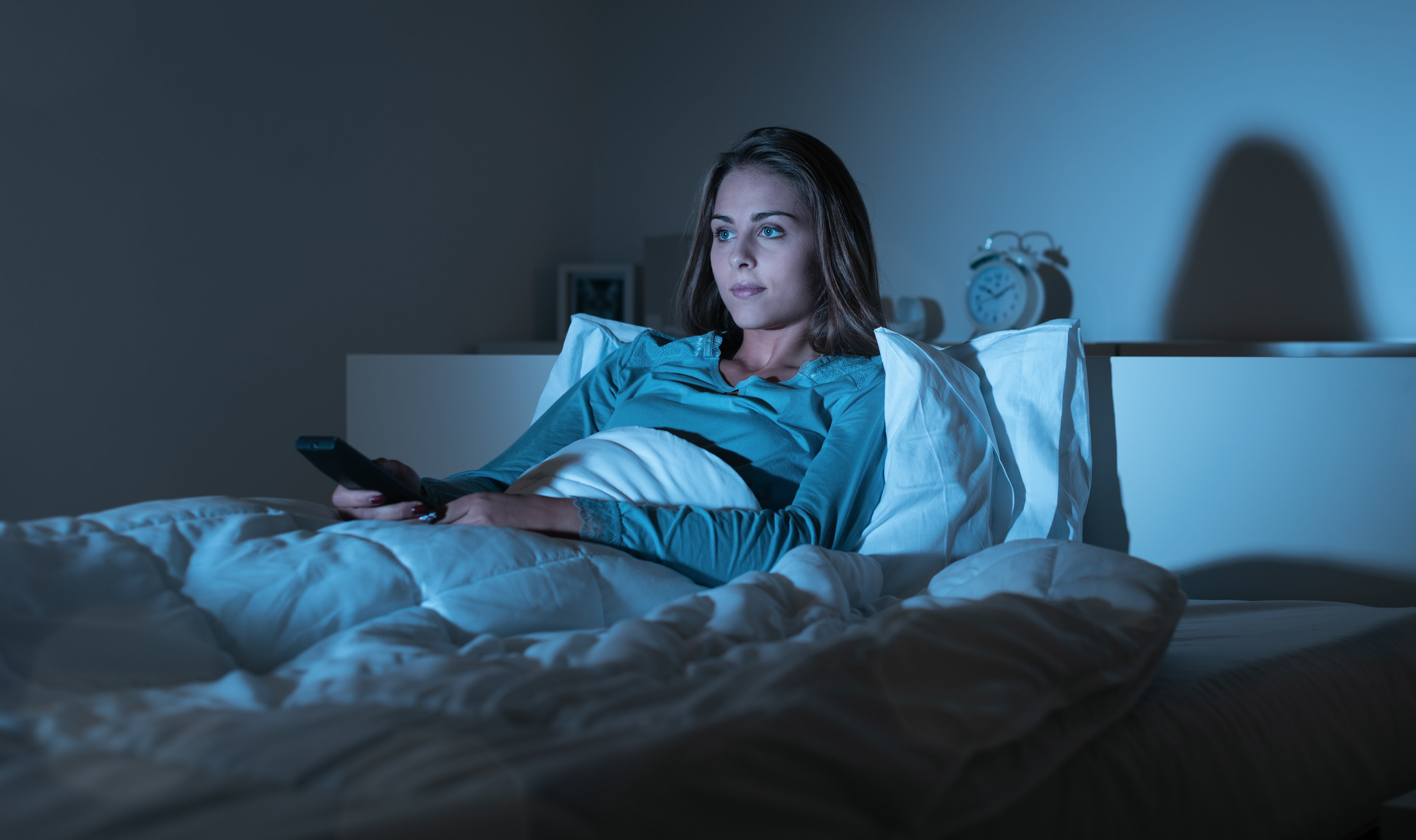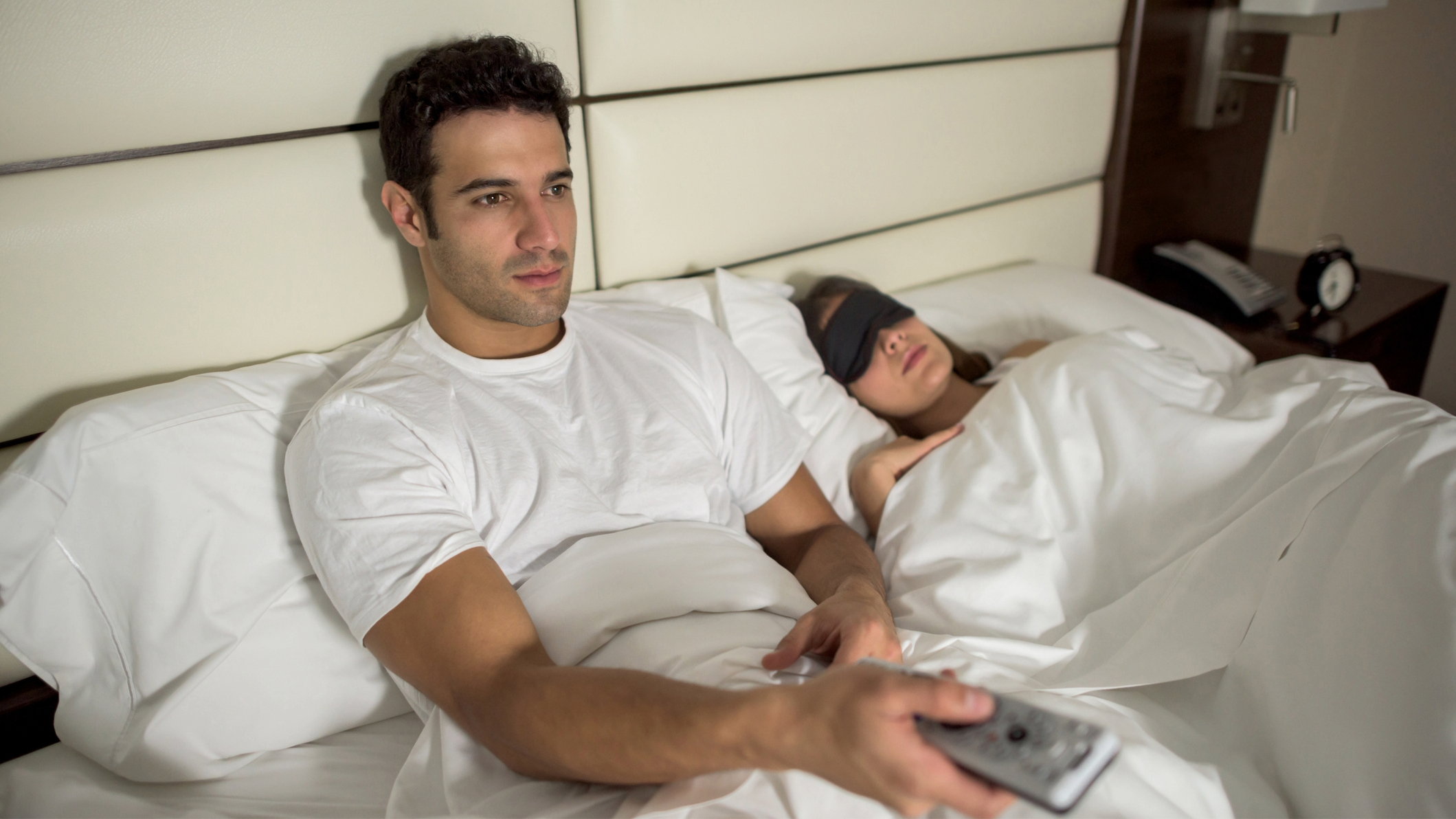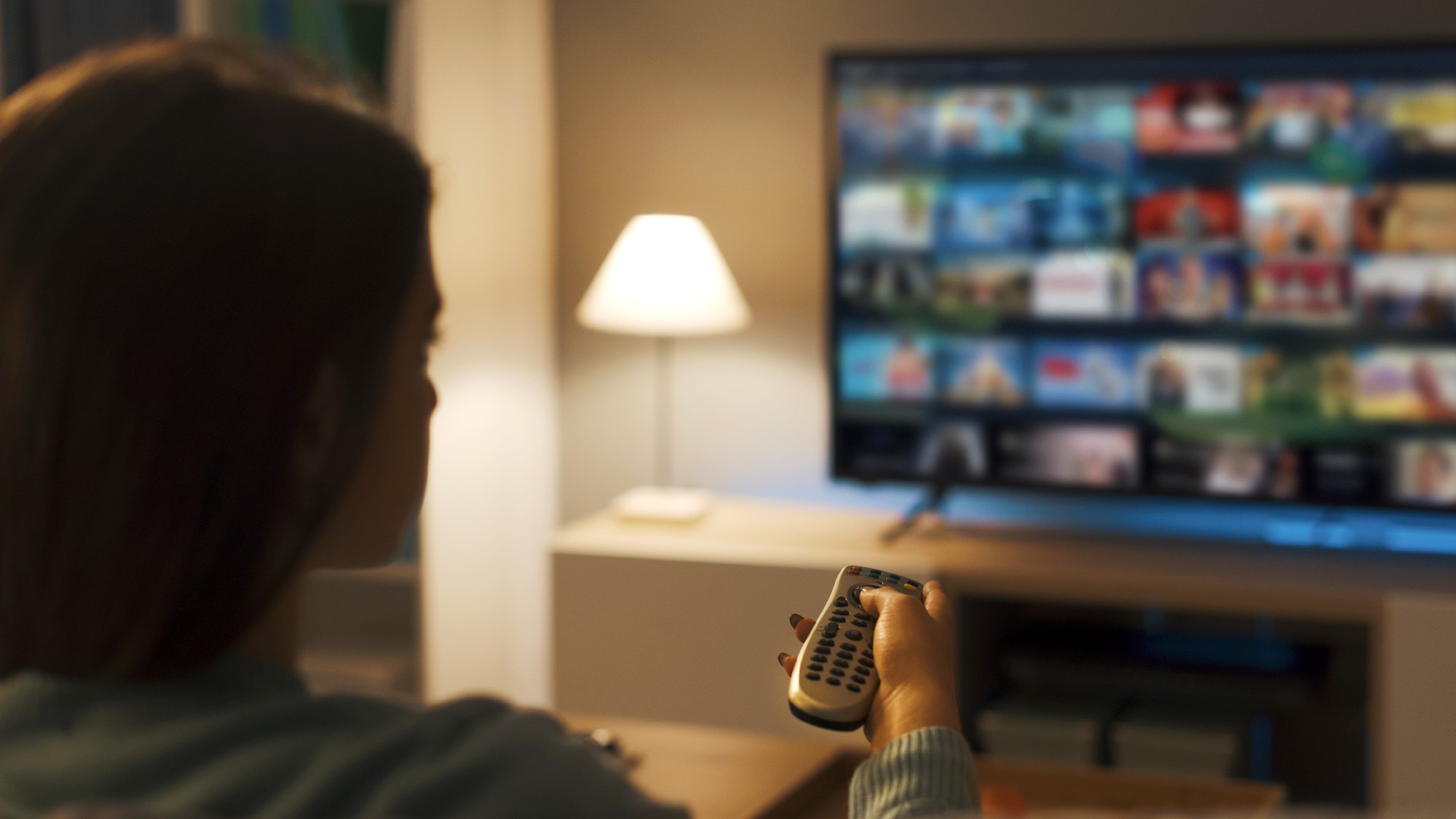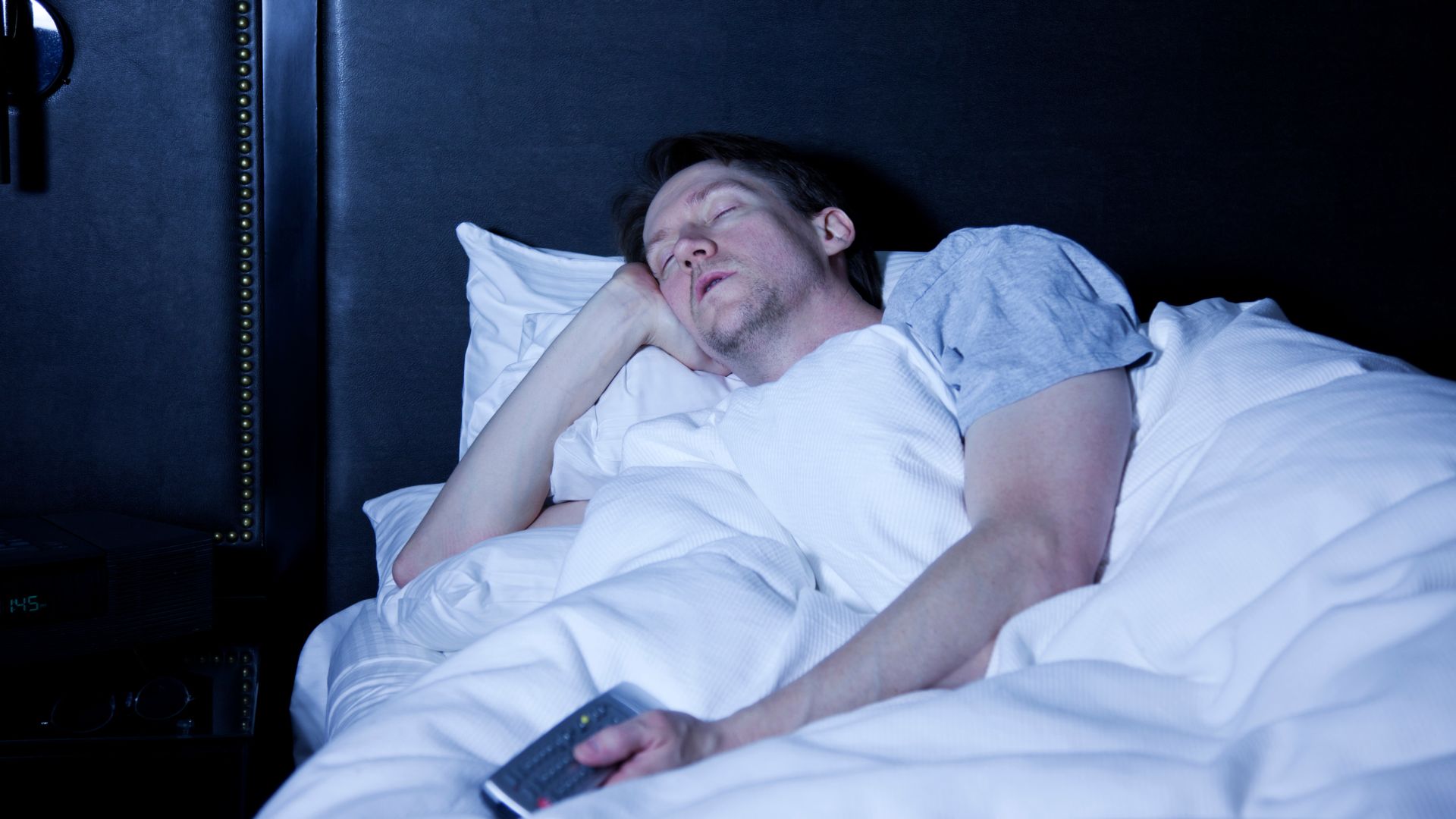Is watching TV in bed that bad for your sleep? Here's what the experts say
Watching TV in bed is part of many people's nighttime routine, but is it really that bad?

From a late-night movie to "just one more episode" of a new show, watching TV in bed is a part of many people's wind-down routine before sleeping. However, we're also regularly told that a dark, screen-free room is the ideal sleep environment. So is watching TV in bed really that bad for your slumber?
While there are numerous things you can do to aid sleep, including investing in the best mattress for your sleep style or keeping your bedroom at the optimum temperature, you may be wondering if these efforts will be derailed if you're watching TV in bed.
We talked to two sleep experts, sleep psychologist and consultant Dr Nicola Cann and Mattress Firm sleep advisor Dr Jade Wu, to find out whether watching TV in bed before sleeping really is that big of a deal. Plus, they share their top tips for not only building a screen-free bedtime routine, but also for watching TV in bed without it negatively affecting your sleep.
Is watching TV in bed really that bad for sleep?
If you find that watching TV in bed helps you to unwind after a long day, you are not alone. According to a Belgian sleep study, watching TV in bed before sleep is a common part of many bedtime routines, with a third of adults reporting that they use television as a sleep aid.
However, the same study also found that using media, including TV, as a sleep aid increased fatigue and coincided with later wake-up times and bedtimes. The research also found that those who used TV or other forms of media as a sleep aid scored higher on the Pittsburgh Sleep Quality Index (PSQI), indicating poor sleep quality.
However, according to Dr Cann, the effects of TV in bed on our sleep aren't so clear cut:
"Watching TV in bed can be a help or a hindrance to getting enough good sleep," she explains. "But if you don’t have any trouble falling asleep, you’re regularly getting enough good quality sleep, and TV in bed is relaxing for you, then by all means go ahead."
Sign up to get the BEST of Tom's Guide direct to your inbox.
Get instant access to breaking news, the hottest reviews, great deals and helpful tips.
How watching TV in bed impacts sleep
1. Leads to sleep disruptions
While some people find that watching TV helps them sleep, often dozing off in front of the box, this doesn't necessarily mean the sleep they're getting is of good quality — especially if the TV stays on while you're fast asleep.
"If you have the TV on all night or for a significant amount of time while sleeping, it will interfere with sleep quality," explains Dr Wu. "It will interrupt your sleep more, keeping you in lighter stages of sleep, and potentially causing stressful dreams, even if you aren't conscious of it."
2. Overstimulates the brain

So, what if you only watch TV in bed before you sleep, switching it off right before your head hits the pillow? "If you watch TV in bed and turn it off before you intend to sleep, that's better, but the stimulation can have similar effects," explains Dr Wu.
The sleep advisor also tells us that watching TV in bed can make you associate your bedroom with wakefulness and stimulation. "This can automatically make your brain more active when you're in bed," she says.
Dr Cann agrees: "That’s why the advice for people with insomnia is usually to only use bed for sleeping and physical intimacy. If we regularly watch TV in bed, our brains and bodies start to anticipate this and it can lead to us becoming more alert just as we should be winding down."
3. Postpones sleep
Ever told yourself that you'll watch only watch one episode before going to sleep, only to end up watching an entire season?
This type of bedtime procrastination is common among those who use TV as a sleep aid, and can lead to both getting to sleep later and subsequently, waking up later the next day, something that the aforementioned sleep study calls "time shifting".
"Whilst it can help some people to relax before drifting off, for others it can lead to a much later bedtime than we’d planned," says Dr Cann. "It’s really all about what time we switch the TV off. We can experience a state of ‘flow’ while watching TV — that feeling of losing track of time because we’re so focused on what we’re doing. The research tells us that people can become engrossed in what they’re watching and are then more likely to go to sleep much later than they planned to."
How to watch TV in bed without it impacting your sleep
However, if you find that watching TV in bed helps you to relax and unwind before it's time to go to sleep, that doesn't mean you have to give it up completely. Here, Dr Wu and Dr Cann explain how you can watch TV in bed without it ruining your sleep.
1. Watch most TV outside the bedroom

"Ideally, it's best to watch TV outside the bedroom," advises Dr Wu. "If this is not possible, or it's been a comforting habit watching TV in bed for a long time and you're unwilling to give it up, there are compromises that can be helpful."
For example, she suggests doing most of your TV watching outside of bed, and then going to bed for the last episode of your favorite show.
2. Watch familiar or relaxing shows
Dr Wu also suggests that, if you find that watching TV in bed is a fixture of your wind-down routine, try only watching relaxing shows instead of distressing or exhilarating content, such as the news or action movies. Dr Cann also recommends watching your favorite or familiar shows, as they tend to be comforting and won't pique excitement before trying to fall asleep.
3. Set limits
One of the main reasons why watching TV in bed can have a negative impact on sleep is that it can make us lose track of time, especially if your viewing habits include binge-watching or hopping from show to show. That's why both Dr Cann and Dr Wu suggest placing clear limits when watching TV in bed.
"Set yourself some rules about how long you’re going to watch TV for, or how many episodes of your favourite show you’re going to watch," Dr Cann says.
She adds: "Create easy ‘stopping points’ by disabling auto-play features so you’ll be more likely to turn the TV off at the end of an episode, and plan your viewing so that you’re not midway through your favorite TV episode when it’s time to go to sleep."

Another issue may be that you routinely fall asleep in front of the TV, which causes sleep disruptions.
However, Dr Wu says there is a way to avoid this.
"Set a timer so the TV turns itself off shortly after when you usually fall asleep," she advises. "That way the light and sound will not be interrupting your sleep all night. Better yet, listen to an audiobook or relaxing podcast on a sleep timer instead of watching TV, which tends to be lower stimulation and doesn't involve light."
4. Use it as a distraction from negative thoughts
If you find that watching TV in bed helps you fall asleep, this could be due to "cognitive control", which Dr Cann describes as a way to ways to minimise racing thoughts before bed by giving your brain something else to focus on.
"Watching TV can serve as a useful distraction," she says. "You’re keeping your brain busy so that you don’t have space for the negative thoughts that can keep you awake."
5. Find another relaxing bedtime ritual

If you find watching TV is a relaxing bedtime ritual, but notice that you're still suffering from fatigue or sleep disruptions when you cut down on that habit, you may want to consider a calming alternative.
Dr Wu suggests screen-free rituals such as taking a hot shower or bath, journaling or chatting with a "low-drama" friend, stretching, cuddling pets, reading, or listening to music or an audiobook.
Meanwhile, Dr Cann suggests physical relaxation techniques like breathing exercises and visualisation strategies for sleep, such as picturing yourself walking through a forest. If you use a TV as a distraction from racing thoughts, then she also suggests using other cognitive control techniques such as playing word games or doing simple mental arithmetic.
"Anything that keeps you focused on the task without it being too engaging or difficult can help," she says. "Any of these strategies can be incorporated into a relaxing and enjoyable bedtime routine that you can look forward to."

Frances Daniels is a PPA-accredited journalist and Sleep Staff Writer at Tom's Guide with an MA in Magazine Journalism from Cardiff University. Her role includes covering mattress and sleep news and writing sleep product reviews and buyer's guides, including our Best Hybrid Mattress 2025 guide. She is hugely interested in the relationship between good sleep and overall health, interviewing a wide array of mattress and sleep experts to create well-informed articles about important topics such as nutrition, sleep disorders (from sleep apnea to night terrors), lucid dreaming, sleep hygiene, and mattress care. She is also our specialist on mattress toppers — producing mattress topper reviews and taking care of our Best Mattress Toppers 2025 guide — and takes the lead on all content related to fiberglass-free mattresses for a clean, non-toxic sleep. Outside of Tom's Guide, she has written for Ideal Home, Homes & Gardens, and Marie Claire.
